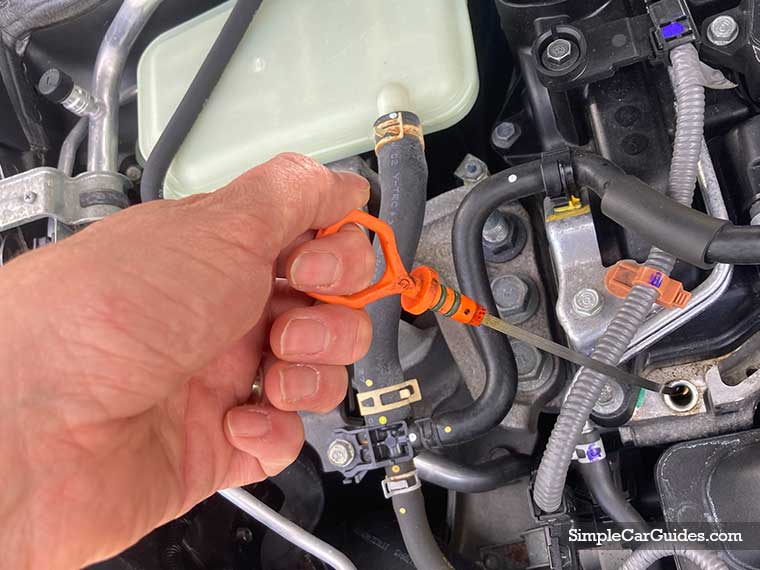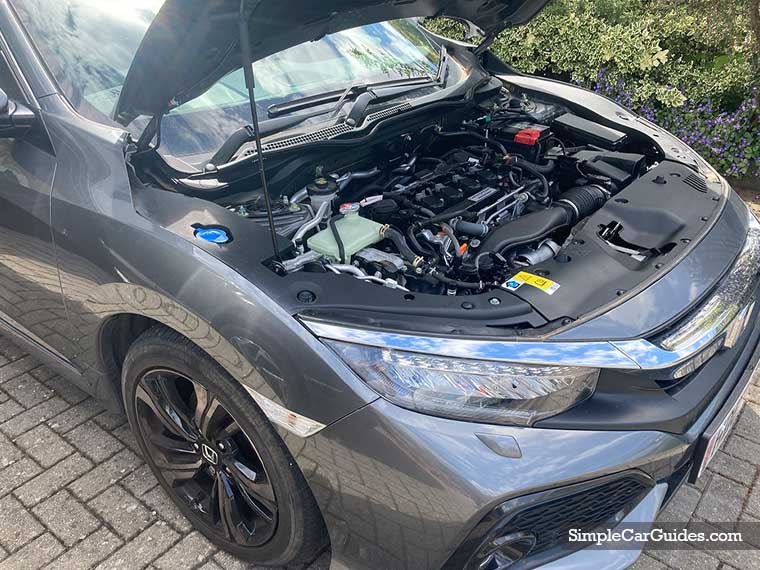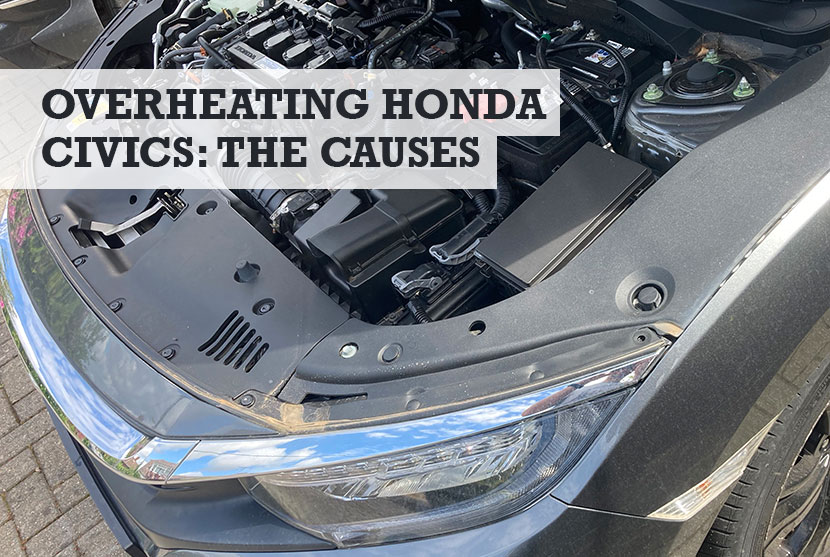If your Honda Civic is running hot, be aware that it can cause damage and very quickly turn serious unless resolved. So, switch your engine off, let it cool down, and read this ultimate guide to the causes of overheating in a Honda Civic.
Thankfully not all Honda Civic overheating problems are as serious as some and can be quickly fixed. Others will require specialist help. But I don’t want to scare you too much, so let’s start with the simplest possible causes, before the more serious ones.
Overheating can occur after a long drive, while driving, or when your Civic is idling. All these causes and more are below, starting with the not so serious and won’t necessarily leave you stranded on the side of the road.
Honda Civic overheating: causes & problems
Before I start, if you’re driving your Civic when it starts to overheat, pull over. I explain how far you can drive when overheating lower down the page.
1. Low coolant level
One of the most obvious Honda Civic overheating causes will be a low coolant level. This can be caused by a lot of different underlying issues but can also be as simple coolant loss over time, which is normal for a car.
It needs to be regularly checked and topped up. You can buy replacement coolant on Amazon.
2. Coolant leaks
Coolant leaks will be indicated by a low coolant level but also wet spots under the car or wet coolant hoses and other parts of the engine.
3. Clogged coolant hose
Another reason for why your Honda Civic overheating could be a clogged coolant hose. To check for this, stop the car, let it cool down until it’s cold, and then remove the radiator cap.
You can now check the inside of the radiator with a torch to see if the radiator fluid looks thick like muddy water, or if you get an aroma of rubber.
Another sign will be the radiator fins. If your Civic has been overheating then they might have turned white and crusty, which will have clogged the radiator and coolant hose.
4. Low engine oil
Although this is far less common a cause of for a Honda Civic overheating, it is still possible and it’s easy to check, so it’s worth making sure that it’s not the oil level that’s causing overheating.
If your Civic is burning through oil or leaking oil, that low level can lead to overheating. With too little engine oil, it continues to heat up and has no way of cooling down. As a result, the coolant finds it harder to siphon off excess heat.

So, those are the simpler causes, and now for the more complicated causes than can be harder to diagnose and repair.
5. Stuck thermostat
A stuck thermostat will cause your Civic’s engine to overheat but it can also mean it won’t be able to warm up and get the engine up to normal operating temperatures.
6. Radiator fan not working
The radiator fan not working is another common overheating cause in Civics, although a more complicated one, since it doesn’t necessarily mean that the fan itself is faulty.
7. Faulty water pump
This is one of the more serious causes and it is a somewhat common issue as they will wear out and can be relatively expensive to replace.
8. Radiator damage
Damage to the radiator can sometimes be done by something as small as a rock or even hitting a bird, so it might happen without you even noticing it.
9. Clogged or bad heater core
This is potentially the most expensive single repair when it comes to a Civic overheating as it is the most labor-intensive… and with that comes a high price tag.
What to do if your Honda Civic is overheating?
As there are different causes of an overheating Honda Civic, there are also different symptoms and different solutions. Some you can solve on the spot but others will make the car undrivable.
Starting with the first, low coolant level.
This has a very simple symptom and that is the coolant temperature gauge going past the middle, anywhere from only slightly to too high. You can check your coolant level by finding the coolant reservoir in your engine bay and on it will be a marking indicating low and high.

Make sure the coolant level is somewhere in the middle. However, if it’s near the low marking or below it, then add some pre-mixed coolant to the reservoir.
If you don’t have access to any, then the next best thing is distilled water, but in the case of an emergency, normal drinking water will do just fine.
Moving on to low engine oil.
If your car is overheating and your coolant level is fine, check your oil level with a dipstick. Whilst this isn’t a common cause of overheating, if you notice that it is low, make sure to add some as soon as you can.
If you don’t know what kind of oil to get, this blog post will help.
Symptoms of overheating due to coolant leaks can be wet spots under your car, a wet engine, and sometimes what looks like smoke coming from the engine bay all combined with a low coolant level.
Coolant can leak from a lot of different locations, but no matter where it’s coming from, it should be serviced as soon as possible. If you must continue driving, you can keep adding coolant or water to the coolant tank if you stop as soon as the water temperature gauge starts rising.
If it’s a stuck thermostat symptoms can go both ways.
It can either cause an overheating engine, a cold running engine, or a combination of both, depending on whether it was stuck in an open or a closed position. If you notice that your engine is sometimes overheating and sometimes not being able to get up to temperature, then you can be sure it’s the thermostat.
The thermostat will need replacing (here’s a Honda one on Amazon) and if it gets stuck in a closed position, then you should not drive your Civic anywhere.
If, however, all these pre-checks are normal, normal coolant level, normal oil level, and the car raising the temperature normally but simply slowly going past the middle, then you should check if your radiator fan is running when this happens.
The car is best serviced right away, but if you just keep driving, make sure you are not putting too much stress on the engine and keep it in the highest gear whenever that’s possible.
Also, always keep an eye on the temperature gauge. All of this can be caused by a faulty radiator fan but also a bad coolant temperature sensor or a bad relay switch, so it might not be too expensive to fix.
If none of these symptoms apply to your car, then it might be a broken water pump.
The most distinctive symptom of a broken water pump is a whining noise coming from that part of the engine, but it might also include leaking coolant from the water pump. If this is the case, you should stop driving your car no matter what and have it towed to a service shop.
A damaged radiator will mostly include a lot of the same symptoms as earlier, such as leaking coolant and low coolant levels, but it might also include the passenger heater not working.
Depending on the severity of the damage, it should be serviced immediately. If it was, on the other hand, punctured, then you will know that that is the case since the coolant will most probably be leaking at very high pressure.
A bad heater core will probably be the most expensive one to fix since the whole dashboard usually needs to come out, so most of that cost will be spent on labor.
Symptoms will usually be obvious as they include your Civic’s heater not working, the smell of coolant inside the car, and coolant leaking under the dashboard. The severity of these symptoms can vary widely.
Possible Civic engine damage after overheating
As I stated earlier, possible engine damage caused by overheating can damage the engine in one of the following ways:
- A cracked engine block for one means you will need an engine replacement.
- A warped cylinder head that might not be noticeable right away will also need to be replaced and can cause further overheating issues even after the first cause of overheating has been solved.
- A cracked head gasket will bring with it a multitude of different problems such as coolant going into the cylinders and further damaging the engine.
- Various gasket and bearing failures, including the ones on a turbocharger if the car is equipped with one.
Different scenarios where your Civic might overheat / run hot
Honda Civic is overheating after a long drive
Engines get hot after driving, and you will feel heat coming off the hood or bonnet of the Civic (how to open). That doesn’t necessarily mean your Honda Civic is overheating after a long drive, but this is just normal engine heat.
If it is overheating after a long drive, it could relate to a plugged radiator, faulty thermostat, a plugged radiator, collapsed hoses, problems with cooling fans, faulty water pump, or the Civic’s drive belt.
Your Civic might have an engine fault after a long drive. This could be a leaking head gasket which has caused the overheating. You might see liquid underneath your car.
Honda Civic is overheating while driving
If your Honda Civic is overheating while driving, pull over, kill the engine, and give it 20 to 30 minutes to cool down.
Cars tend to overheat when driving due to issues with the cooling system when heat cannot escape engine compartment. There’s a possible leak or blockage causing it.
Honda Civic is overheating while idling
If you’re sat idling when your Honda Civic starts to overheat, and you also notice that the temperature gauge needle goes down when you start to move and pick up speed, it’s likely a problem with the radiator fan.
The reason it goes down is as you drive, air flows over the Civic’s radiator, which will cool it, or cool down the coolant more specifically. When you stop, and are you idling, your Honda Civic will overheat again as the air flow has stopped too.
If your car was working properly, at the point you stop the Civic and idle, the radiator fan should come on so create the air flow instead before you drive. But in this case, it’s not working.
You might also overheat your Honda Civic when idling if the coolant is contaminated or needs topping up.
Related questions
How far can I drive my overheating Civic?
I don’t recommend that you drive any further than a quarter of a mile once the Civic starts to overheat. Any more than that and there’s a risk you could damage the engine beyond repair.
Whilst some vehicles can continue driving up to 20 miles when overheating, depending on the reason, I don’t recommend you do, but pull over and get the car cooled down.
How much does it cost to fix an overheating Honda Civic?
This is bit like that question of how long a piece of string is. Because, unless you know what the cause of your Honda Civic overheating is, you won’t know how much it will cost to fix and repair.
However, I can give you some rough guidance based on the possible causes. Depending on what caused the overheating Honda Civic, it can be anywhere from $100 to $250 for a thermostat replacement, between $200 and $550 for a new radiator, and $900 to $1,200 for a new heater core.
What causes Honda Civic intermittent overheating?
Intermittent overheating in a Civic is most often due to a bad thermostat where the ambient temperature is too high, clogged radiator, or a clogged heater core.
Conclusion
An overheating engine is always a serious issue, no matter what caused it.
Any time your engine overheats it causes some damage and that can very quickly turn serious to the point of having to rebuild the whole engine.
With that in mind, I’d recommend pulling over as soon your Honda Civic starts to overheat.







